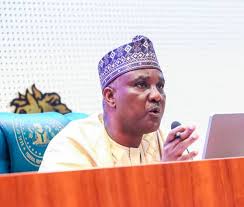16 Days Of Activism: Speaker Abbas Tasks State Assembly Speakers On Elimination Of GBV
By Gloria Essien, Abuja
The Speaker of State Houses of Assembly have been charged to end Gender Based Violence (GBV) in Nigeria.
The Speaker of the House of Representatives Mr. Tajudeen Abbas gave the charge at the convergence of Speakers of State Houses of Assembly to commemorate the conclusion of the 16 days of activism against Gender-based Violence in Abuja.
The event is one of the activities lined up by the House of Representatives to mark the 16 Days of Activism Against Gender-Based Violence (GBV).
The Speaker said that the campaign began on November 25th, with the People’s House taking a prominent role.
Mr. Abbas also said that the involvement of the House signified its resolve to combat violence against Nigerian women and to reinforce our collective commitment to creating a safer and more equitable society.
“As we mark the conclusion of this critical campaign today, we also celebrate International Human Rights Day. These 16 days have served as a rallying point, uniting diverse stakeholders in a shared mission to protect and empower women and girls across Nigeria.
“The National Assembly has long been at the forefront of the fight against GBV and the advocacy for greater women’s representation. Since 1999, we have championed transformative legislative reforms, including the enactment of the Violence Against Persons (Prohibition) Act (VAPP), the Child Rights Act, and the Trafficking in Persons (Prohibition) Enforcement and Administration Act. These laws have laid a solid foundation for addressing GBV and advancing gender equity.
“The 10th Assembly has amplified these efforts through its Legislative Agenda, which prioritises constitutional reforms to promote women’s political participation and representation.
This agenda reflects our recognition of the indispensable role women play in governance and the broader societal fabric. Women are the cornerstone of our families and communities, yet their political representation remains unacceptably low. This imbalance must change—not for improved statistics but for the transformative value women bring to governance, leadership, and policymaking” Mr. Abass said.
Read Also: 16 Days Activism: House to End Women Based Violence
16 Days of Activism: House of Reps Outlines Programmes
He said that the importance of eradicating GBV and promoting women’s representation cannot be overstated.
“A society that protects its women and leverages their potential is one that secures its future. Women are the glue that holds our families and communities together. Despite this, systemic barriers, including cultural norms, economic inequality, and inadequate legal protections, have hindered their full participation in political and public life” he said.
The Speaker also said that the 10th Assembly has taken proactive steps to address the barriers.
“Recognising past pitfalls, we have commenced the constitutional amendment process early to allow for extensive consultation and consensus-building. The House Committee on Constitution Amendment has embarked on robust sensitisation and advocacy efforts, engaging stakeholders to build support for provisions that will constitutionalise greater women’s representation.
“These efforts go beyond tokenism. Affirmative action for women is not undemocratic; it is a necessary corrective measure to address historical inequities and unlock our nation’s full potential. Many African countries, such as Rwanda and South Africa, have successfully enshrined affirmative action in their constitutions.
“The 2003 Constitution of Rwanda mandates that at least 30% of positions in decision-making organs be reserved for women, a policy that has propelled women to hold 61.3% of parliamentary seats. Similarly, recent reforms to the Indian Constitution allocate 33% of seats for women in the Lok Sabha and State Legislative Assemblies. Nepal’s Constitution requires that women make up at least one-third of the total members of the federal parliament. In Uganda, the Constitution ensures one woman representative for every district in Parliament. Meanwhile, Tanzania’s Constitution reserves special seats for women, comprising no less than 30% of parliamentary seats. Zimbabwe’s Constitution also guarantees 60 additional seats for women in the National Assembly during its first two parliaments after enactment. Nigeria must embrace this progressive trend – not only to align with global advancements in gender inclusion but also to set a leading example for others” he said.
Mr. Abbas pointed out that state Houses of Assembly are pivotal to achieving meaningful constitutional reforms and that the active participation and support of State Speakers are crucial in ensuring that gender-focused amendments and legislation are adopted at the subnational level.
“I commend the Speakers here today for their progressive stance and for being the most forward-thinking group of Speakers since 1999. Your support for gender-based bills and proposals currently before the National Assembly is a testament to your commitment to building a more inclusive Nigeria.
“I understand the challenges you face and urge you to engage in constructive dialogue to refine these proposals. Let us work together to integrate your perspectives into the final legislation, ensuring that no valid concerns are left unaddressed” he said.
The Speaker said that the House of Representatives remains resolute in its commitment to advancing gender equity.
Mr. Abbas added that the time has come to challenge stereotypes and misconceptions that have long hindered women’s progress.
Emmanuel Ukoh


Comments are closed.